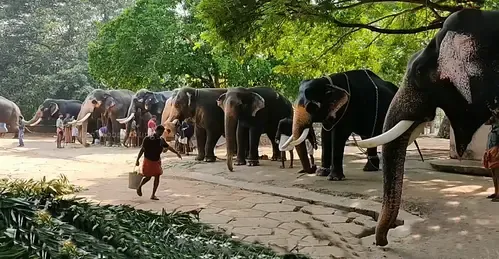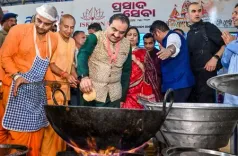What’s New in Guruvayur? Rejuvenation Therapy for 22 Elephants Kicks Off!

Synopsis
Key Takeaways
- Annual rejuvenation therapy for elephants is a significant cultural event.
- 22 elephants are undergoing this therapy this year.
- The event is held at the Punnathurkotta, celebrating its golden jubilee.
- Strict dietary protocols are followed during the therapy.
- The temple prohibits entry to non-Hindus.
Guruvayur, July 1 (NationPress) The annual tradition of the 31-day rejuvenation therapy for the elephants belonging to the renowned Sree Krishna Temple, managed by the Guruvayur Devasom, officially began on Tuesday morning.
Local legislator K. Rajan, who also serves as the State Revenue Minister from the district, was present at the event.
During the ceremony, V.K. Vijayan, president of Guruvayur Devasom and the overseer of this month-long rejuvenation therapy, stated, "Under the Guruvayur Punnathurkotta, there are 36 elephants, and this year, 22 elephants are receiving their annual rejuvenation therapy."
Interestingly, this renowned Punnathurkotta, situated three kilometers from the temple, is celebrating its golden jubilee, marking 50 years since the opening of this special elephant enclosure.
"The month-long event will cost the Guruvayur Devasom Rs 12.5 lakh," Vijayan added.
"Every day begins with an oil bath for all the elephants. There are strict protocols regarding their diet, which includes rice, ragi, pulses, chavana prasam, and minerals as prescribed by the veterinary doctors supervising the treatment," Vijayan explained, noting that this month-long therapy is akin to the rejuvenation treatments that humans undergo during the monsoon season.
This well-known elephant camp spans 11.5 acres and houses the largest population of captive elephants.
Owned by the famous Sree Krishna Temple, this camp is recognized as one of the 108 Abhimana Kshethram in the Vaishnavate tradition.
The central idol features a four-armed standing Vishnu, holding the conch Panchajanya, the discus Sudarshana, the mace Kaumodaki, and a lotus adorned with a tulsi garland.
This representation is said to depict Vishnu as revealed to Krishna's parents, Vasudeva and Devaki, around the time of his birth.
It is important to note that all non-Hindus are prohibited from entering the temple.









